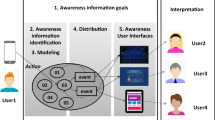Abstract
Detecting the presence or absence of collaboration during group work is important for providing help and feedback during sessions. We propose an approach which automatically distinguishes between the times when a co-located group of learners, using a problem solving computer-based environment, is engaged in collaborative, non-collaborative or somewhat collaborative behaviour. We exploit the available data, audio and application log traces, to automatically infer useful aspects of the group collaboration and propose a set of features to code them. We then use a set of classifiers and evaluate whether their results accurately match the observations made on video-recordings. Results show up to 69.4% accuracy (depending on the classifier) and that the error rate for extreme misclassification (e.g. when a collaborative episode is classified as non-collaborative, or vice-versa) is less than 7.6%. We argue that this technique can be used to show the teacher and the learners an overview of the extent of their collaboration so they can become aware of it.
Access this chapter
Tax calculation will be finalised at checkout
Purchases are for personal use only
Preview
Unable to display preview. Download preview PDF.
Similar content being viewed by others
References
Stahl, G.: Collaborative learning through practices of group cognition. In: Proc.CSCL 2009, International Society of the Learning Sciences, Rhodes, Greece, pp. 33–42 (2009)
Soller, A., Martinez, A., Jermann, P., Muehlenbrock, M.: From Mirroring to Guiding: A Review of State of the Art Technology for Supporting Collaborative Learning. JAIED 15(4), 261–290 (2005)
Hattie, J., Timperley, H.: The Power of Feedback. Review of Educational Research 77(1), 81–112 (2007)
Chaudhuri, S., Kumar, R., Howley, I., Rose, C.: Engaging Collaborative Learners with Helping Agents. In: Proc. AIED 2009, pp. 365–372. IOS Press, Amsterdam (2009)
Duque, R., Bravo, C.: A Method to Classify Collaboration in CSCL Systems. In: Adaptive and Natural Computing Algorithms, pp. 649–656. Springer, Heidelberg (2007)
Perera, D., Kay, J., Koprinsca, I., Yacef, K., Zaiane, O.: Clustering and Sequential Pattern Mining of Online Collaborative Learning Data. In: IEEE TKDE 2009, vol. 21, pp. 759–772 (2009)
Anaya, A., Boticario, J.: Application of machine learning techniques to analyse student interactions and improve the collaboration process. J. Expert Systems with Applications 38(2), 1171–1181 (2011)
Wallace, J., Scott, S., Stutz, T., Enns, T., Inkpen, K.: Investigating teamwork and taskwork in single-and multi-display groupware systems. Personal and Ubiquitous Computing 13(8), 569–581 (2009)
van Dongen, B.F., de Medeiros, A.K., Verbeek, H., Weijters, A., van der Aalst, W.M.: The ProM Framework: A New Era in Process Mining Tool Support, pp. 444–454 (2005)
Dillenbourg, P.: What do you mean by ’collaborative learning’? In: Collaborative Learning: Cognitive and Computational Approaches, pp. 1–19. Elsevier Science, Amsterdam (1998)
Weinberger, A., Fischer, F.: A framework to analyze argumentative knowledge construction in CSCL. Computers & Education 46(1), 71–95 (2006)
Harris, A., Rick, J., Bonnett, V., Yuill, N., Fleck, R., Marshall, P., Rogers, Y.: Around the table: are multiple-touch surfaces better than single-touch for children’s collaborative interactions? In: Proc. CSCL. 2009, Rhodes, Greece, pp. 335–344 (2009)
Bousbia, N., Labat, J., Balla, A., Rebai, I.: Analyzing Learning Styles using Behavioral Indicators in Web based Learning Environments. In: Proc. EDM 2010 (2010)
Author information
Authors and Affiliations
Editor information
Editors and Affiliations
Rights and permissions
Copyright information
© 2011 Springer-Verlag Berlin Heidelberg
About this paper
Cite this paper
Martinez, R., Wallace, J.R., Kay, J., Yacef, K. (2011). Modelling and Identifying Collaborative Situations in a Collocated Multi-display Groupware Setting. In: Biswas, G., Bull, S., Kay, J., Mitrovic, A. (eds) Artificial Intelligence in Education. AIED 2011. Lecture Notes in Computer Science(), vol 6738. Springer, Berlin, Heidelberg. https://doi.org/10.1007/978-3-642-21869-9_27
Download citation
DOI: https://doi.org/10.1007/978-3-642-21869-9_27
Publisher Name: Springer, Berlin, Heidelberg
Print ISBN: 978-3-642-21868-2
Online ISBN: 978-3-642-21869-9
eBook Packages: Computer ScienceComputer Science (R0)




